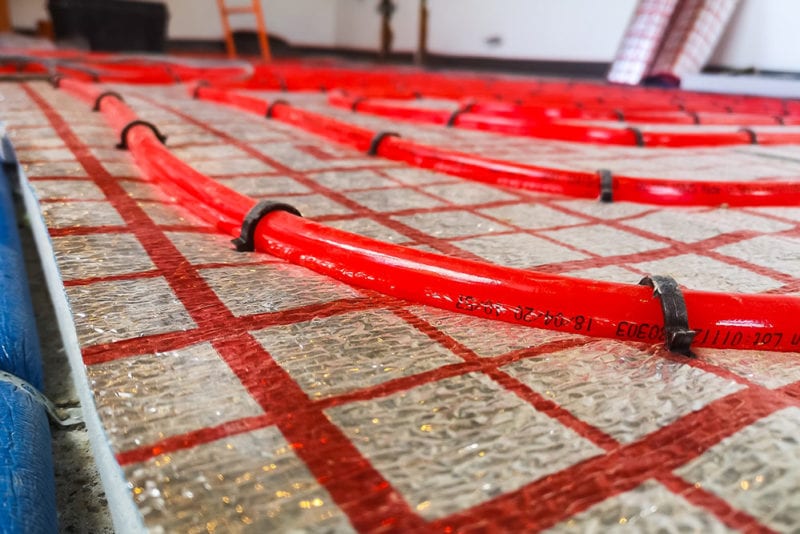Imagine waking up on a frosty Iowa morning and walking comfortable across your warm kitchen instead of tiptoeing across the frigid tile floor. Add an extra level of comfort to your new home with a radiant floor heating system. Aspen Aire installs both electric and hydronic floor heating for home construction projects in Des Moines and central Iowa.
Call today for a free quote for radiant heat installation or repairs.

Benefits of Radiant Floor Heating
- Even heating with no hot spots
- No uncomfortable, cold floors
- Feel more comfortable at a lower temperature
- Heat different zones or rooms separately
- Less heat loss than from forced air heating systems
- Saves on energy bills
- As much as 30% more efficient than forced-air heat
- Low-maintenance
- No dust and allergens blowing in the air
Professional Radiant Floor Heating Contractors in Des Moines
Aspen Aire is a trusted, experienced radiant heating contractor in Polk County and a licensed HVAC company serving the Des Moines area since 2006.. Whether you choose electric radiant heat or hydronic radiant floor heating, we’ll design and install a system that will help you stay comfortable all winter.
If you’re building a new home, contact us today for a free, customized estimate for a radiant floor heating system.

What Is A Radiant Floor Heating System?
A radiant floor heating system uses a heat source underneath the flooring to warm its surface as well as the air and objects above it. There are two types of in-floor heat: electric and hydronic.
Electric Floor Heating – With electric radiant floors, electric wiring is woven into a mat that’s installed under the flooring. Electric radiant floor heating can be turned on and off but the system takes 30 minutes to an hour to heat up. The cost of electricity should be considered, as it can offset some of the energy savings of in-floor heating.
Hydronic Floor Heating – With hydronic radiant floors, plastic tubing is installed below the flooring. Heated water from a water heater or boiler circulates through the tubing to maintain the temperature. Hydronic heat systems are low-maintenance, energy efficient and last for years.
In-floor radiant heating systems can be used in a home or a garage. The heating elements are commonly installed on a concrete slab under tile or some types of wood flooring. Carpet is also an option, although floor coverings can create so much insulation that the heat doesn’t really come through, especially if there’s thick padding under it.
How Does Radiant Floor Heating Work?
Radiant floor heating works similar to a radiator. Electric wiring or hot-water-filled plastic tubing snakes back and forth beneath the flooring, keeping it at a comfortable temperature. Waves of thermal radiation rise up from the floor to warm objects on and above it. This is similar to the way a sidewalk puts off heat on a hot, sunny day. A heated floor generally reaches a temperature of about 85 degrees – enough to feel warm but not hot to the touch. Because the entire floor is heated, the room feels warm all over and the cooler air stays up near the ceiling.
In comparison, traditional forced-air systems, whether supplied by a furnace, boiler or heat pump, blow warm or hot air out of vents and into rooms. The hot air rises toward the ceiling and cooler air is forced down toward the floor. This causes floors to feel cold even when the rest of the room is at a comfortable temperature. And, because the heat runs until the desired temperature is reached and then shuts off, you may actually feel cooler at the set temperature because the hot air isn’t blowing into the room.
Request a Quote for Radiant Floor Heating Installation
If you’re building a new home in the Des Moines area and the thought of walking across soothing heated floors on frigid winter mornings is appealing, contact Aspen Aire today for a free, customized estimate for a radiant floor heating system.
Frequently Asked Questions
Is radiant floor heating more energy efficient than traditional central heating systems?
In general, radiant floor heating is highly energy efficient because there’s no heat loss through the ductwork like with forced air heating systems. The heat comes directly from the source and rises to warm the room from the ground up. The actual energy efficiency of an in-floor radiant heating system depends on the flooring type used and the heating source.
Can radiant floor heating be installed under any type of flooring?
Tile and stone flooring are ideal for radiant heating because they conduct heat well. Most types of flooring will work but they may not be as effective. A professional installer like Aspen Aire can recommend the best flooring type for your home’s floor heating system.
How much does a radiant heating system cost to install?
The installation costs will depend on the size of room it’s being installed in as well as whether it’s a hydronic or electric floor heating system. A hydronic floor heating system usually costs more to install but is cheaper to operate. Electric systems, on the other hand, are less expensive to install but may cost more to operate.

